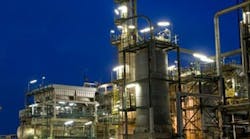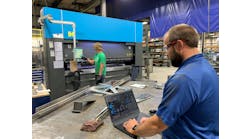Check out ControlGlobal.com on Google+ and Keith Larson's Google+ profile.
Some things in the life of a process unit are inevitable. One certainty is that the process unit itself will last longer than its control system, and at some point – or several – in its lifetime you'll have to negotiate the transition from old control technology to new while minimizing adverse affects on production. The technical and logistical factors are complex enough, but what if you have not one unit but five refineries full of systems approaching the end of their useful life? For Spanish energy and petrochemicals company Repsol, such was the case in 2006.Repsol's refineries faced the imminent obsolescence of an extensive installed based of Honeywell Process Solutions' Multifunction and Advanced Multifunction Controllers (MCs and AMCs) due to the unavailability of electronic components. The controllers still performed well, but Repsol wished to reduce the operating risk that would arise from a dwindling supply of replacement parts.
The scope of the single LCM contract negotiated between Repsol and Honeywell also included the migration of 25 Data Hiways at the five refineries to LCN/UCN networks, and was to be performed within the facilities' maintenance shutdown intervals. The scope of work contracted included assembly of the new controller and marshalling cabinets, wire engineering, database configuration, communications interfaces, graphics migration and documentation, as well as development of any new control schemes necessitated by the migration. A fixed payment every six-months based on the project's final estimated cost was regularized by variable payments/refunds due to plan deviations such as exchange rate and hardware and service requirements.
System migration with an LCM agreement has several advantages, Alonso and Montaño offered. For Repsol, these include the ability to essentially approve 25 smaller projects all at once within the scope of one large agreement; the flexibility to move hardware from one project to another, inside a refinery or between refineries; and flexibility in scheduling. A stable Honeywell services team and predictability in pricing also were key advantages.
And, now that Repsol has refineries with only HPM controllers, the company expects maintenance will be easier and less expensive, too. The company has even begun a similarly structured program for upgrading its PLCs.







